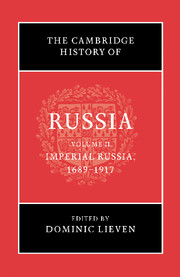Book contents
- Frontmatter
- Introduction
- Part I Empire
- 1 Russia as empire and periphery
- 2 Managing empire: tsarist nationalities policy
- 3 Geographies of imperial identity
- Part II Culture, Ideas, Identities
- Part III Non-Russian Nationalities
- Part IV Russian Society, Law and Economy
- Part V Government
- Part VI Foreign Policy and the Armed Forces
- Part VII Reform, War and Revolution
- Bibliography
- Index
- Map 5. The Russian Empire (1913). From Archie Brown, Michael Kaser, and G. S. Smith (eds.) Cambridge Encyclopedia of Russia 1982.">
- Plate Section">
- References
2 - Managing empire: tsarist nationalities policy
from Part I - Empire
Published online by Cambridge University Press: 28 March 2008
- Frontmatter
- Introduction
- Part I Empire
- 1 Russia as empire and periphery
- 2 Managing empire: tsarist nationalities policy
- 3 Geographies of imperial identity
- Part II Culture, Ideas, Identities
- Part III Non-Russian Nationalities
- Part IV Russian Society, Law and Economy
- Part V Government
- Part VI Foreign Policy and the Armed Forces
- Part VII Reform, War and Revolution
- Bibliography
- Index
- Map 5. The Russian Empire (1913). From Archie Brown, Michael Kaser, and G. S. Smith (eds.) Cambridge Encyclopedia of Russia 1982.">
- Plate Section">
- References
Summary
Almost from its inception, Russia has been a multinational state. Long before anyone spoke of the ‘Russian Empire’ (Rossiiskaia Imperiia), a designation that dates from the latter part of Peter I’s reign, a variety of ethnic groups lived in territories claimed by the Muscovite tsar. However, the very concepts of nations and nationality, now considered a central element of human identity, were largely absent in Imperial Russia, at least until the later nineteenth century. Rather, religion played a far more central role in defining what was ‘foreign’ than language or ‘ethnicity,’ a slippery concept at best. The role of the Orthodox religion (Pravoslavie) for Russian identity cannot be overstated. Thus a ‘Catholic Russian’ or ‘Muslim Russian’ even today are conceptually difficult for many Russians to accept.
In Russian – unlike English – one can differentiate between Russian as a cultural-ethnic category (russkii) and Russian as a political geographical designation (rossiiskii). In practice, however, the distinction was never made consistently in the imperial period, not even by officials who should have known better. Even more inconsistent, perhaps, is the use of the term ‘Russification’ both at the time and in subsequent historiography. The Russian Empire did not ‘embrace diversity’ – such an idea would have seemed absurd to the tsars and their servitors. They took for granted the predominance of Russian culture (including language) and the Russian Orthodox religion within the empire. But Imperial Russia also lacked the resources and even will to carry out consistent and activist programmes of national assimilation or ‘ethnic cleansing’ whether through education or more violent methods. Tsarist ‘nationalities policy’ was not, in fact, one single policy. Rather, there were very different measures taken in, say, the Caucasus, Poland or Central Asia, at different times.
- Type
- Chapter
- Information
- The Cambridge History of Russia , pp. 27 - 44Publisher: Cambridge University PressPrint publication year: 2006
References
- 7
- Cited by



